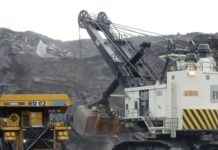
[miningmx.com] — Upstart Australian miner Fortescue Metals Group broke ranks to forge a slightly cheaper iron ore price with Chinese steel mills in exchange for up to $6 billion in funding, giving Beijing’s beleaguered industry group a much-needed face-saving win.
Chinese officials touted the 35% reduction in prices for the second half of the year as the new “reference” for negotiations with major suppliers, but world No. 2 producer Rio Tinto quickly rejected Monday’s deal as irrelevant, suggesting little room for compromise on its earlier agreed 33% cut.
Although the deal seemed to narrow the gap in fraught and prolonged talks over billions of dollars worth of iron ore, analysts were quick to point out that Fortescue had specific reasons to compromise: its need for financing to expand; its part ownership by a Chinese mill; and lower-quality ore.
“Fortescue are trying to be the good guys for the Chinese. They are the new kid in town and want to secure relationships with the big consumers,” said Mark Pervan, senior commodities analyst at ANZ. Fortescue began production only last year.
“They are in ramp-up mode, so they want the cash flow.”
Chinese officials hailed the deal as a welcome compromise that might help break the deadlock in annual talks with Rio Tinto, BHP Billiton and Brazil’s Vale, hoping to prevent a complete breakdown in a four-decade-old negotiated pricing ritual that is rapidly fracturing, and became further complicated this year by a corporate spying scandal.
“Chinese iron ore price talks have achieved an important…success, but are not at all finished,” China Iron and Steel Association Vice-Chairman Liu Zhenjiang told reporters.
CISA had gradually softened its position from seeking a 45% price cut when talks began some 10 months ago, effectively reversing last year’s near doubling in prices, to seeking anything better than the 33% reduction.
Liu said the price — effectively 3% lower than the benchmark that Rio set with Japanese and South Korean mills in May — was reasonable and benefited all parties.
“China is trying to unite the price and stop the dramatic volatility…in the market,” Forrest said. “We have attached a very small discount but it is meaningful in China.”
Analysts said the agreement appeared more of a coup for Fortescue Chief Executive Andrew Forrest than for CISA’s Secretary General Shan Shanghua, who had staked CISA’s reputation on winning a better deal. Monday’s briefing made clear that top mill Baosteel, not CISA, had been the principle dealmaker.
The deal is conditional on the completion of $5.5 billion to $6 billion in Chinese financing by September 30, Fortescue said. It also said it was seeking advisers for a Shanghai listing and would get “priority” in any annual 2010 price negotiations, although Forrest ruled out selling more equity to China.
Sovereign wealth fund China Investment Corp is in advanced talks over a $1 billion-plus convertible bond with Fortescue, sources told Reuters last week.
The final price for iron ore sales from Australia and Brazil to China remains unsettled, casting a shadow over miners’ main source of revenue and the core cost component for Chinese mills that now make just about half of the world’s steel.
Discount to Rio
Fortescue agreed to supply iron ore fines at US$0.94 per dry metric tonne unit — a 35.02% fall from the previous year — and iron ore lumps at $1 per dry metric tonne unit for the second half of 2009, a 44% fall. It compares to a US$0.97 a tonne benchmark that Rio set for its fines sales in May.
But even that decline belies the benefit for Fortescue, whose ore is typically only 59 percent iron compared with 63.5% for Rio’s and BHP’s benchmark. This means Fortescue has accepted a minimal decline despite an 8 percent difference in purity.
“Fortescue’s managed to limit the downside of the price cuts,” said DJ Carmichael & Co mining analyst James Wilson.
The deal, for 20 million tonnes of ore in the rest of 2009, will cover only a fraction of China’s iron ore imports, which are running at more than 50 million tonnes a month.
But Fortescue is aiming to increase output to 95 million tonnes next year, according to CISA — nearly half as much as world No. 2 miner Rio Tinto expects this year — aiding its campaign to break into the iron ore market.
Fortescue signed the pact with CISA and with Baosteel, China’s top steel mill, which had led annual pricing talks until CISA took over this year.
Shan said though CISA was the organiser of the negotiations, Baosteel was the real representative for the mills, suggesting he may be backing away from the leading role.
By agreeing on prices only for the second of the year, both sides left themselves open for an improvement should market conditions change, and also put another crack in the the 40-year-old benchmark pricing system.
Shan said next year’s conditions would determine whether China continued to negotiate on a half-year basis.
Stalemate
The deal will allow CISA to point to a success as its talks with the big firms appear to have reached stalemate, mired in a diplomatic row over the arrest of four Rio employees suspected of stealing commercial secrets and bribery.
CISA will negotiate with the three miners using the Fortescue prices as a reference, Shan said. He said Fortescue had promised to supply to all Chinese clients at “one price”.
But analysts were doubtful it would make much progress, with spot market prices having surged 50% since the initial 33% deal and a number of Chinese steel mills having already broken away from CISA to agree that price on their own.
“We do not see this pricing agreement as relevant to our pricing for fiscal 2009,” Rio Tinto said.
CISA has long wanted Chinese importers to agree to stick to one price, rather than driving up local prices by re-selling to each other, but has so far failed to win any agreement.
FMG has been wooing Chinese steel makers and investors, marketing itself to more than 40 different customers as an alternative supplier to its two much larger Australian rivals.
CISA says the three top miners have too much pricing power, but the rapid growth of the Chinese steel industry means the iron ore market is still a sellers market.










